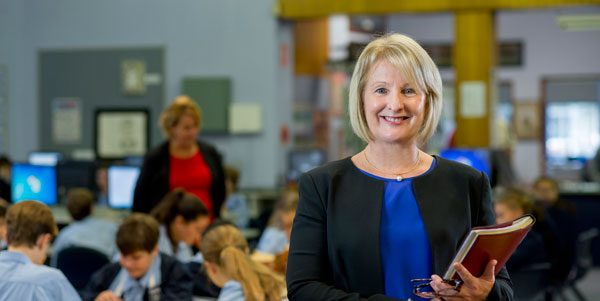Researcher Highlights
Revolutionising teacher professional development
Professor Jenny Gore and Dr Julie Bowe, from the University of Newcastle’s (UON) Teachers and Teaching Research Centre, are transforming the quality of teaching in NSW with an innovative approach to professional development for teachers.
Quality Teaching Rounds, the brainchild of Gore and Bowe, enables teachers to draw on their own strengths and the advice of their peers to find creative ways of improving their practice.
Using an evidence-based model whereby small groups of colleagues watch a lesson in progress and assess performance, each teacher takes a turn to host a round – similar to medical rounds used to teach junior doctors in hospitals.

It enables teachers to feel really positive about themselves and their work. And it’s having demonstrable impact on student learning overall and on equity outcomes.
The lesson is coded and discussed by the teacher and the observers against the dimensions of quality teaching identified in the Quality Teaching model, which was developed by Gore and Associate Professor James Ladwig. Breaking down teaching into its key elements enables teachers to notice and analyse exactly what's happening in the lesson.
“Although the coding process is central to achieving depth and specificity in the analysis, teachers quickly realise it’s not about the numbers, it’s about the professional conversations they have in the experience,” Gore said.
Unlike most professional development for teachers – where they might attend a workshop but then never have the opportunity to apply what they’ve learned – this approach enables teachers to use a combination of their own professional judgement and evidence generated through a research-informed framework to work out how to improve their practice.
“We’ve found that teachers are really excited about this way of working and the opportunity it creates for them to analyse in detail what they are doing and collectively work on ways to improve teaching practice,” Gore said.
“Because the focus is very much on teaching rather than the individual teacher, it really ensures people don’t feel personally judged but instead feel supported, and often affirmed. It enables teachers to feel really positive about themselves and their work. And it’s having demonstrable impact on student learning overall and on equity outcomes.”
The Quality Teaching model is already used in more than 2,300 government, 300 Catholic and 30 independent schools throughout Australia. It has been shown to make lessons more intellectually engaging and challenging, improve the learning environment, and increase the significance of what is learned.
Together with their colleagues, Professor Max Smith, Professor David Lubans and Dr Nicole Mockler, Gore and Bowe conducted a scientific trial in 2014 to test the effectiveness of the QTR approach with a randomly selected group of public schools in NSW – with a view to providing the academic rigour necessary for Quality Teaching Rounds to be rolled out more broadly.
Earlier analysis of Quality Teaching Rounds suggested it produces significantly higher quality teaching and thus benefits students, for example by raising NAPLAN scores in the classes of teachers who have participated.
“It puts a focus on the things that should and will matter to students in terms of enhancing their life at school and building a commitment to lifelong learning,” Smith said.
The 2014 randomised controlled trial involved 24 schools which were divided into two intervention groups and one control group. Observers were ‘blinded’ as to which group received which intervention (the control group received their intervention the following year). The research team was inundated with interest from schools, with nearly 250 applying to take part in the trial.
Results of the trial demonstrated positive effects of the approach on both the quality of teaching and teacher morale. These effects were consistent across school sectors, school level of advantage, and teachers’ years of experience – and were also sustained 6 months post-intervention.
On the basis of earlier research conducted by Gore and Bowe, the NSW Government has written the Quality Teaching model and Quality Teaching Rounds into its blueprint (Great Teaching Inspired Learning) for all NSW Schools.
The team hopes to introduce Quality Teaching Rounds across all public schools in the State. “This is impactful research embedded in policy with the potential to change the preferred model of teaching and teacher development in schools across the state,” Smith said.
The University of Newcastle acknowledges the traditional custodians of the lands within our footprint areas: Awabakal, Darkinjung, Biripai, Worimi, Wonnarua, and Eora Nations. We also pay respect to the wisdom of our Elders past and present.
